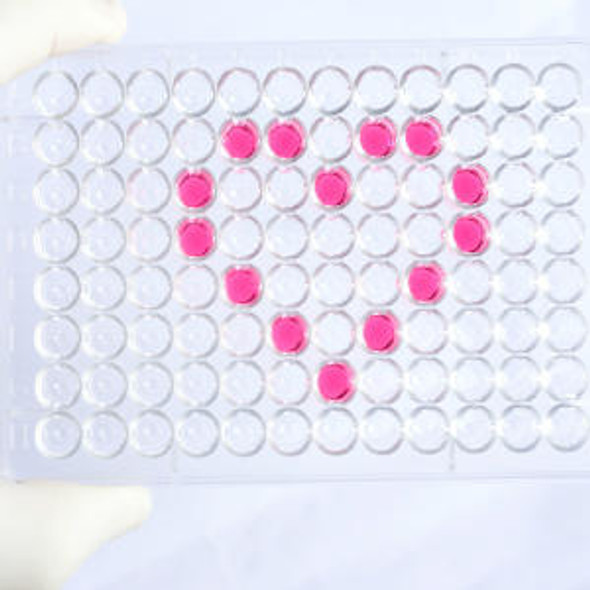Human VCAM1 Recombinant Protein (RPPB5117)
- SKU:
- RPPB5117
- Product type:
- Recombinant Protein
- Size:
- 50ug
- Species:
- Human
- Target:
- VCAM1
- Synonyms:
- Vascular cell adhesion protein 1
- V-CAM 1
- INCAM-100
- CD106
- Source:
- HEK293 Cells
- Uniprot:
- P19320
Description
| Product Name: | Human VCAM1 Recombinant Protein |
| Product Code: | RPPB5117 |
| Size: | 50µg |
| Species: | Human |
| Target: | VCAM1 |
| Synonyms: | Vascular cell adhesion protein 1, V-CAM 1, INCAM-100, CD106, VCAM1, L1CAM, MGC99561, DKFZp779G2333. |
| Source: | HEK293 Cells |
| Physical Appearance: | Sterile Filtered White lyophilized (freeze-dried) powder. |
| Formulation: | VCAM1 was lyophilized from a 0.2 µM filtered solution of 20mM PB, 150mM NaCl, 2mM CaCl2, 2mM MgCl2 and 5%Threhalose, pH 7.2. |
| Solubility: | It is recommended to reconstitute the lyophilized VCAM1 in 1xPBS to a concentration no less than 100 µg/ml, which can then be further diluted to other aqueous solutions. |
| Stability: | Lyophilized VCAM1 although stable at room temperature for 3 weeks, should be stored desiccated below -18°C. Upon reconstitution VCAM1 should be stored at 4°C between 2-7 days and for future use below -18°C. Please prevent freeze-thaw cycles. |
| Purity: | Greater than 95% as determined by SDS-PAGE. |
| Amino Acid Sequence: | FKIETTPESRYLAQIGDSVSLTCSTTGCESPFFSWRTQIDSPLNGKVTNEGTTSTLTMNPVSFGNEHSYLCTATCESRKLEKGIQVEIYSFPKDPEIHLSGPLEAGKPITVKCSVADVYPFDRLEIDLLKGDHLMKSQEFLEDADRKSLETKSLEVTFTPVIEDIGKVLVCRAKLHIDEMDSVPTVRQAVKELQVYISPKNTVISVNPSTKLQEGGSVTMTCSSEGLPAPEIFWSKKLDNGNLQHLSGNATLTLIAMRMEDSGIYVCEGVNLIGKNRKEVELIVQEKPFTVEISPGPRIAAQIGDSVMLTCSVMGCESPSFSWRTQIDSPLSGKVRSEGTNSTLTLSPVSFENEHSYLCTVTCGHKKLEKGIQVELYSFPRDPEIEMSGGLVNGSSVTVSCKVPSVYPLDRLEIELLKGETILENIEFLEDTDMKSLENKSLEMTFIPTIEDTGKALVCQAKLHIDDMEFEPKQRQSTQTLYVNVAPRDTTVLVSPSSILEEGSSVNMTCLSQGFPAPKILWSRQLPNGELQPLSENATLTLISTKMEDSGVYLCEGINQIRKAQLKDAGVYECESKNKVGSQLRSLTLDVQGRENNKDYFSPEVDHHHHHHAGRSRKEVELIIQVTPKDIKLTAFPSESVKEGDTVIISCTCGNVPETWIILKKKAETGDTVLKSIDGAYTIRKAQLKDAGVYECESKNKVGSQLRSLTLDVQGRENNKDYFSPEVDHHHHHH |
VCAM1 is a member of the Ig superfamily. It is a cell surface sialoglycoprotein expressed by cytokine activated endothelium. VCAM-1 contains 6 or 7 immunoglobulin domains, and is expressed on both large and small vessels only after the endothelial cells are stimulated by cytokines. The protein has a number of functions including the regulation of leukocyte migration, leukocyte endothelial cell adhesion and signal transduction and may play a role in a number of inflammatory diseases (artherosclerosis and rheumatoid arthritis).
VCAM1 Human Recombinant produced by mammalian expression system in human cells is a single polypeptide chain containing 682 amino acids (25-698). VCAM1 is fused to an 8 amino acid His-tag at C-terminus & purified by proprietary chromatographic techniques.
| UniProt Protein Function: | VCAM1: Important in cell-cell recognition. Appears to function in leukocyte-endothelial cell adhesion. Interacts with the beta-1 integrin VLA4 on leukocytes, and mediates both adhesion and signal transduction. The VCAM1/VLA4 interaction may play a pathophysiologic role both in immune responses and in leukocyte emigration to sites of inflammation. 2 isoforms of the human protein are produced by alternative splicing. |
| UniProt Protein Details: | Protein type:Membrane protein, integral; Motility/polarity/chemotaxis; Cell adhesion Chromosomal Location of Human Ortholog: 1p32-p31 Cellular Component: Golgi apparatus; extracellular space; cell surface; microvillus; endoplasmic reticulum; early endosome; integral to membrane; apical part of cell; plasma membrane; podosome; sarcolemma; filopodium; external side of plasma membrane Molecular Function:amine oxidase activity; integrin binding; cell adhesion molecule binding Biological Process: response to nicotine; regulation of immune response; chronic inflammatory response; extracellular matrix organization and biogenesis; viral reproduction; heart development; cytokine and chemokine mediated signaling pathway; cell-matrix adhesion; response to lipopolysaccharide; heterophilic cell adhesion; leukocyte adhesion; response to ethanol; response to zinc ion; B cell differentiation; membrane to membrane docking; response to hypoxia; positive regulation of T cell proliferation; amine metabolic process; response to ionizing radiation; cell adhesion; leukocyte tethering or rolling; acute inflammatory response; response to nutrient; aging |
| NCBI Summary: | This gene is a member of the Ig superfamily and encodes a cell surface sialoglycoprotein expressed by cytokine-activated endothelium. This type I membrane protein mediates leukocyte-endothelial cell adhesion and signal transduction, and may play a role in the development of artherosclerosis and rheumatoid arthritis. Three alternatively spliced transcripts encoding different isoforms have been described for this gene. [provided by RefSeq, Dec 2010] |
| UniProt Code: | P19320 |
| NCBI GenInfo Identifier: | 137560 |
| NCBI Gene ID: | 7412 |
| NCBI Accession: | P19320.1 |
| UniProt Secondary Accession: | P19320,Q6NUP8, A8K6R7, B4DKS4, E9PDD1, |
| UniProt Related Accession: | P19320 |
| Molecular Weight: | 74,346 Da |
| NCBI Full Name: | Vascular cell adhesion protein 1 |
| NCBI Synonym Full Names: | vascular cell adhesion molecule 1 |
| NCBI Official Symbol: | VCAM1 |
| NCBI Official Synonym Symbols: | CD106; INCAM-100 |
| NCBI Protein Information: | vascular cell adhesion protein 1; CD106 antigen |
| UniProt Protein Name: | Vascular cell adhesion protein 1 |
| UniProt Synonym Protein Names: | INCAM-100; CD_antigen: CD106 |
| Protein Family: | Vascular cell adhesion protein |
| UniProt Gene Name: | VCAM1 |
| UniProt Entry Name: | VCAM1_HUMAN |










